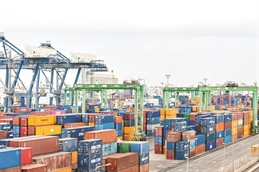
The United Nations Conference on Trade and Development (UNCTAD) forecasts that maritime trade growth will slow, citing, among others, the drag from the Covid-19 pandemic.
In its Review of Maritime Transport 2021, UNCTAD noted that while the maritime trade was able to “weather” the Covid-19 storm, it faces “far-reaching knock on effects.”
The UN agency said maritime trade growth will decelerate to 2.4% between 2022 and 2026, compared to 2.9% over the past two decades.
“The Covid-19 pandemic’s impact on maritime trade volumes in 2020 was less severe than initially expected but its knock-on effects will be far-reaching and could transform maritime transport,” it said.
The report shows that maritime trade contracted by 3.8% in 2020, in what UNCTAD said reflected “an initial shock,” but it rebounded later in the year and is projected to increase by 4.3% in 2021.
The medium-term outlook for maritime trade remains positive but subject to mounting risks and uncertainties, it added.
“A lasting recovery will depend on the path of the pandemic and largely hinges on being able to mitigate the headwinds and on a worldwide vaccine roll-out,” said UNCTAD Secretary-General Rebeca Grynspan, noting that the impacts of the Covid-19 crisis will hit small island developing states and least developed countries the hardest.
UNCTAD said the pandemic “exposed and magnified challenges that already existed in the maritime transport industry” – particularly labour shortages and infrastructure needs.
“It raises concern over the continuing pandemic-induced crisis around crew changes, with lockdowns, border closures and lack of international flights leaving hundreds of thousands of seafarers stranded at sea, unable to be replaced or repatriated,” the agency added.
In its Review of Maritime Transport 2021, UNCTAD called for “urgent attention” from flag, port, and labour-supplying states to end the crew change crisis, insisting that all states should be parties to relevant international legal instruments, including the Maritime Labour Convention of 2006.
UNCTAD also urged government, industry and international organizations to facilitate crew changes as it told them to “ensure that seafarers are designated as key workers and vaccinated as a matter of priority.”
The report said supply chain bottlenecks have hindered economic recovery, as the rebound in trade has run into pandemic-induced logistical challenges, including shortages of equipment and containers, less reliable services, congested ports and longer delays and dwell times.
“Supply-side constraints in container shipping are also rocking maritime transport and trade. While orders for new ships declined by 16% in 2020, continuing a downward trend of previous years, in 2021 shipping companies responded to the capacity limitations with a surge of new orders,” the agency said.
It added that the increasing costs of container shipping have been a challenge for all traders and supply chain managers, “but especially so for smaller shippers” who, it said, may be less able to absorb the additional expense and are at a disadvantage when negotiating rates and booking space on ships.
UNCTAD’s report predicts that global import price levels will increase on average by 11% as a result of the freight rate increases, but it said small island developing states that primarily depend on maritime transport for their imports could face increases of up to 24%.
“If the current surge in container freight rates continues, it will significantly increase both import and consumer prices,” the report warns.
UNCTAD noted that if container freight rates remain at their current high levels, global consumer prices are projected to be 1.5% higher in 2023 than they otherwise would have been. However, the rise is expected to be 7.5% in small island developing states and 2.2% in least developed countries.
“In the face of these cost pressures and lasting market disruption, it is increasingly important to monitor market behaviour and ensure transparency when it comes to setting rates, fees and surcharges,” the report added.
Meanwhile, the UN agency noted that the pandemic has accelerated “megatrends” that could transform maritime transport in the longer term.
This includes digitalization and automation, which UNCTAD said “should deliver efficiency and cost savings.”
“However, the shipping industry is also coming to grips with climate adaptation and resilience, and the urgent need to decarbonize and find alternative fuels to reduce emissions, which will inevitably come at a cost,” it added.
Shamika N. Sirimanne, UNCTAD’s director of technology and logistics, said by “exposing the vulnerabilities of existing supply chains, the Covid-19 disruption has also prompted renewed debate over “globalization and the supply chains of the future.”
“On concerns over increased reshoring and nearshoring the report points out that it may be straightforward to reshore labour-intensive and low-value production, but it’s more complex to move production and switch suppliers for mid- and high-value-added manufacturing.”
The report predicts a blend of reshoring, diversification, replication and regionalization, with China still likely to remain a leading manufacturing site.
Meanwhile, it said e-commerce, accelerated by the pandemic, has transformed consumer shopping habits and spending patterns and driven the demand for distribution facilities and warehousing that are digitally enabled and offer value-added services.
“This could generate new business opportunities for shipping and ports,” the report said.
By Charlee C. Delavin
Asia Cargo News | Hong Kong



